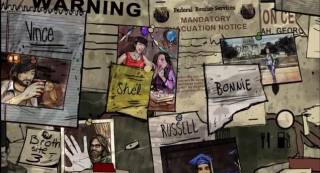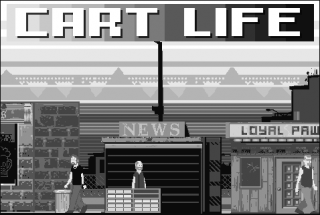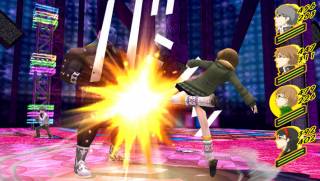Monthly Roundup, July 2013
By majormitch 2 Comments
I haven’t done much video game related writing this year, for a number of reasons. Primarily, I wanted to get away from weekly writing; for as much as I can enjoy it, it simply takes too much time. Once a week is also a little too frequent to consistently say meaningful things about video games for a guy with a 40 hour job that has nothing to do with either video games or writing, and I don’t like forcing it. I had a few other ideas for things to try this year, but ended up writing and scrapping a lot of stuff because it ultimately didn’t feel right. Without going into any more detail, I think I’m realizing that my most natural (and enjoyable) form of video game writing is to simply talk about the nuts & bolts of what I’ve been playing, and the challenge for me is finding the right balance of when and how to do that.
To that end, I want to get back to some more regular writing, and it’s going to be about finding that balance. To start, I’m going to aim for a “monthly roundup” style post and see how it goes. I thought about first trying to go back and collect some thoughts on various games I played earlier in the year and haven’t written about, but that’s simply too much. Instead, I’m just going to dive right on in with a July roundup. One final note: I don’t plan on mentioning every game I play each month, only the ones for which I feel like I have something interesting to say. Anyway, with all of that out of the way, let’s get to it!
The Walking Dead: 400 Days

I came away from the first piece of content for The Walking Dead since Season 1’s fantastic ending feeling pretty underwhelmed. One of the biggest strengths of that first season was how easy it was to become invested in the game’s large cast of great characters over an appropriate amount of time and scenarios. This gave a lot more weight to your actions, and it’s impossible to pull that off in a stand-alone episode like 400 Days. Not only does it stand alone, but it’s shorter than the normal season episodes (it took me about an hour and a half to complete), and it’s divided into five separate sections, each one containing a different set of characters. That’s giving you at most 15-20 minutes with any given character, which is not nearly long enough to be able to care about them. My hope is that these characters feed into Season 2 in interesting ways, which might make the experiment worth it. Otherwise I wasn’t very happy with 400 Days on its own merits.
Additionally, there was a particular moment in 400 Days that really pulled me out of the experience, and it’s something I think any story driven game that portends to give you agency has to deal with in some form or another. Without spoiling anything, it’s a situation where you (the player) can notice something that your in-game character does not, and the game limits your available responses to what your character would actually say or do given their artificially handicapped awareness (not too dissimilar from my frustration with the “white phosphorus” scene in Spec Ops: The Line). This creates a disconnect between your supposed agency as the player and the clear, singular actions the game demands your character take in a way that feels contrived and jarring. I’m all for games having a singular creative vision and forcing your path to meet that vision, but don’t pretend to give me a choice where I’m actually forced to choose a “bad” answer (or else meet a fail state) only because the character isn’t as aware as I am. The problem is solely in the execution, as the scene could have easily played out in a way that served the creative vision without disconnecting the player this harshly.
The Walking Dead as a whole already walked that fine line, but for the most part it’s done it well. During the entirety of Season 1 I never felt that disconnect, which looking back is pretty impressive. It’s tough to pull off, and to be fair most of it is smoke and mirrors to begin with. But on this occasion I saw through the smoke and mirrors, and I didn’t like what I saw. Here’s to hoping it doesn’t happen again.
Cart Life

I finally got around to trying out Cart Life after picking it up in the Steam sale, and I think it’s a very interesting game without being something I want to actually play very much. Cart Life’s basic message is that being a street vendor is hard, and it delivers this message by making absolutely everything in the game a huge hassle. Sometimes I think this comes across in neat ways. For example, once I (finally) got my cart set up one of my first customers was a police officer. After buying a bagel, he then asked if I had a permit. I didn’t even know I needed a permit, so I told him “no” and got fined for it. I then had to spend the majority the day going to the courthouse and figuring out how to get through the line and buy a permit. I found that entire scenario fascinating; it mirrored all sorts of dumb bureaucratic procedures that we all have to deal with, and the way I felt while playing through that lengthy process in Cart Life was very analogous to how I’ve felt having to deal with similar things in real life (DMV anyone?). It’s something I haven’t experienced in a video game before, and it’s cool to see a game experiment with something different.
Unfortunately, I feel like Cart Life takes this idea to the extreme to the point where it makes things that shouldn’t be a hassle a hassle. For example, at the end of my first day I went back home and needed to sleep. I spent a good 5-10 minutes trying to figure out how to go to sleep, and eventually had to look it up (turns out you can’t sleep on an empty stomach). Needing to eat before bed is fine, but why not tell the player that? There’s no benefit to such things being so obtuse, and there are numerous other, similar usability issues that the game doesn’t communicate to the player. It makes simply interacting with the game more trying than I would like, which I think ultimately brings it down. It’s the wrong part of the package to turn into a hassle, and ended up making me not want to play Cart Life that much in the long run.
Persona 4 Golden
Finally, the game I spent (by far) the most time playing during July was Persona 4 Golden. I picked up a PlayStation Vita a few months ago (that’s another story), and Persona 4 has, unsurprisingly, been its breadwinner thus far. While I’m well aware of Giant Bomb’s Persona 4 love, my own Persona history isn’t super rich. I played Persona 3 FES when it came in 2008, and overall I liked it quite a bit. But the game was also super long, and I got incredibly burnt out on it after playing it for over 100 hours. Thus, when Persona 4 came out later that same year I was in no hurry to dive in. I always thought I would eventually get around to it, but didn’t think it would take this long. Yet here I am, playing Persona 4 for the first time in 2013, and on a Vita no less. Strange times.
Anyway, I’m really liking Persona 4 so far. Most of what I like about it are the same things I liked about Persona 3: I like the characters, the writing is sharp, the combat is simple but satisfying, etc. My favorite thing about these games, however, is the balancing act it pulls off between traditional JRPG dungeon crawling and the more simulation style gameplay that defines your typical school day. The games toggle back and forth between two drastically different gameplay styles in a way that flows well, and both sides have a clear impact on how the other unfolds. Each piece is also completely engaging on their own merits, but it’s the way they combine to become even better that makes it stand out to me. All of that translates very well from Persona 3 to Persona 4, and for the most part I’ve enjoyed them roughly equally. If I have to compare, I do like Persona 4 a little better. I feel like there’s something about the pacing that’s smoother (I think not having one, seemingly endless dungeon helps), and I personally prefer the small town setting and characters. Perhaps the most substantial changes, however, come from some interface/usability improvements. Foremost among them is having full party control in battles; not having that in Persona 3 was the worst.

Persona 3’s biggest downside for me was simply its length. I played the game very heavily from start to finish, and I was ready to be done well before I reached the end (never a good feeling). This made the last few dozen hours a tedious slog, which was the main reason I was hesitant to start Persona 4 for so long. To try and counter that, I’m conducting an experiment with Persona 4. I typically play one or two games at a time, focusing pretty heavily on them until I’m done. I know if I do that with Persona 4, however, I’ll burn out on it. So I’ve been playing it more lightly, only when I feel like it, while still playing a normal slate of other games. I try and make sure I play at least a few times a week just so it doesn’t fall by the wayside, but I haven’t been forcing it if I don’t feel like it. And on the times I have felt like it, I’ve put in a few lengthier sessions. I feel like this has helped me stay fresh on it (I just passed the 50 hour mark and feel good), and also lets me continue to play other stuff. I’ve played at least half a dozen other games since starting Persona 4 in June, and I’ve made plenty of progress on Persona 4 at the same time. As such, I feel like the experiment is working, and it feels like a better way to play games this long. I’m going to stick with it.
The only other thing I have to say about Persona 4 for now is that, from what I’ve gathered about Golden’s changes to the PlayStation 2 original (which I never touched), I’m really glad I’m playing this version. Some of that old interface stuff sounds insane (some of it was held over from Persona 3, like abilities carrying over after fusing being randomized), and hopefully Atlus will incorporate Golden’s changes moving forward; that stuff only creates unnecessary barriers. Anyway, none of that has been an issue in this version. So far so good on Persona 4, and I’ll keep playing it well into August.
Currently playing: Persona 4 Golden, Civilization V: Brave New World, Capsized
August releases I'm keeping an eye on: Pikmin 3, Papers, Please, Mario & Luigi: Dream Team, Gone Home, The Bureau: XCOM Declassified
